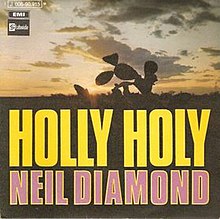Holly Holy
| "Holly Holy" | ||||
|---|---|---|---|---|
 | ||||
| Single by Neil Diamond | ||||
| B-side | "Hurtin' You Don't Come Easy" | |||
| Released | October 13, 1969 | |||
| Genre | Pop, soft rock | |||
| Length | 4:27 (single version) 4:40 (album version) | |||
| Label | Uni | |||
| Songwriter(s) | Neil Diamond | |||
| Producer(s) | Tom Catalano, Tommy Cogbill | |||
| Neil Diamond singles chronology | ||||
| ||||
"Holly Holy" is a song written and recorded by Neil Diamond with instrumental backing provided by the American Sound Studio house band in Memphis. Released as a single on October 13, 1969,[1] it was a successful follow-on to "Sweet Caroline", reaching #6 on the U.S. pop singles chart by December.[2][3] The song also reached #5 on the Easy Listening chart.[4] It became a gold record and then eventually a platinum record.[1]
A work with a spiritual focus,[5] "Holly Holy" was influenced by gospel music[1] and was Diamond's favorite of the songs he had written to that point.[3]
Record World predicted the song "will be as famous as its author and constant hitmaker."[6]
"Holly Holy" was later included on Diamond's November 1969 album Touching You, Touching Me.[1] It has been included in live versions on Diamond's Hot August Night (from 1972) and Greatest Hits: 1966–1992 (from 1992) as well as various compilations.
Chart history
Weekly charts
|
Year-end charts
|
Other versions
Produced by Clancy Eccles in 1970, the song was an instant success for Jamaican reggae group the Fabulous Flames, almost crossing into the UK's popular music chart.[16]
The song was covered by Nancy Sinatra and released on her album Shifting Gears in 2013.[17]
In popular culture
The song was used in Mike Flanagan's Netflix miniseries Midnight Mass during a montage in the third episode. Additionally, it was played live in concert at the end of the 2001 film Saving Silverman during the end credits scene by Neil Diamond (as himself) and the main cast members (in character). It was also featured in the Kevin James film Here Comes the Boom as James's character's entrance song.
References
- ^ a b c d William Ruhlmann. "Neil Diamond: Biography". Allmusic. Retrieved 2008-04-30.
- ^ Whitburn, Joel (1983). The Billboard Book of Top 40 Hits: 1955 to present. Billboard Publications. ISBN 0-8230-7511-7. p. 88.
- ^ a b Jackson, Laura (2005). Neil Diamond: His Life, His Music, His Passion. ECW Press. ISBN 1-55022-707-6. pp. 65–66.
- ^ Whitburn, Joel (1993). Top Adult Contemporary: 1961–1993. Record Research. p. 72.
- ^ Neil McCormick (2008-03-05). "Neil Diamond: the hurt, the dirt, the shirts". The Daily Telegraph. Archived from the original on 2008-05-03. Retrieved 2008-05-02.
- ^ "Single Picks of the Week" (PDF). Record World. October 25, 1969. p. 1. Retrieved 2023-05-04.
- ^ "Item Display - RPM - Library and Archives Canada". Collectionscanada.gc.ca. 1970-01-10. Retrieved 2018-12-15.
- ^ "Item Display - RPM - Library and Archives Canada". Collectionscanada.gc.ca. 1970-01-10. Retrieved 2018-12-15.
- ^ Flavour of New Zealand, 9 January 1970
- ^ "SA Charts 1965–March 1989". Retrieved 5 September 2018.
- ^ Joel Whitburn's Top Pop Singles 1955–1990 - ISBN 0-89820-089-X
- ^ Cash Box Top 100 Singles, January 3, 1970
- ^ Whitburn, Joel (1999). Pop Annual. Menomonee Falls, Wisconsin: Record Research Inc. ISBN 0-89820-142-X.
- ^ Australian-charts.com
- ^ "Item Display - RPM - Library and Archives Canada". collectionscanada.gc.ca. 17 July 2013.
- ^ "Fabulous Flames". AllMusic. AllMusic. Retrieved 29 July 2018.
- ^ "Nancy Sinatra – Shifting Gears". Discogs. Discogs. Retrieved 2023-01-05.
External links
